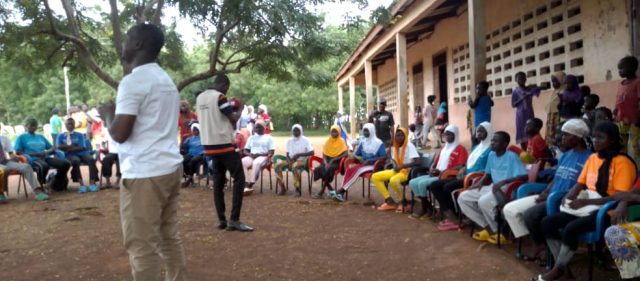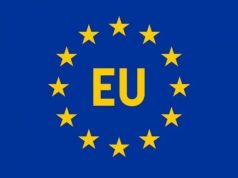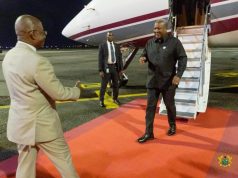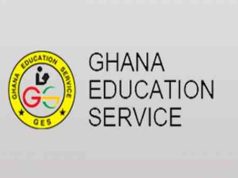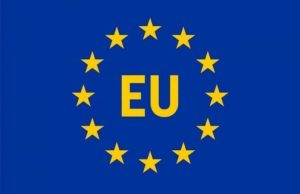The beneficiaries of the Power to Choose Project (P2C) on Sexual and Reproductive Health Rights in the Garizegu community under the Sagnarigu Municipality in the Northern region share their success stories after acquiring mentorship training on Sexual Reproductive Health Rights positively.
Muftawu, a 15-year-old beneficiary of the P2C project, shared his experience. He said she and her friends in the community lack access to health services, considering their SRHR needs. Due to the P2C awareness creation program, they can no longer access SRHR in their communities to improve their well-being.
According to her, the Project has supported and empowered her and other girls in the community to change their mindsets about getting married very early. They are now focusing on education to become better people in the future.
The beneficiaries shared their experiences during the visit of Oxfam International board members, who paid a working visit to Oxfam project activities at the Gurizegu community in the northern.
The Project focused on increasing the knowledge and skills of adolescents and young people on SRHR through awareness creation.
To increase access to and utilisation of quality SRHR information among adolescents in Northern Ghana and to create an enabling environment for adolescent girls and young women to exercise their SRHR.
Saada Shamsia, a 17-year-old beneficiary of the Project, also shared her experience and stated that the knowledge she acquired from the project initiative had developed his supportive attitude towards adolescent SRHR, which would enable her to plan for a better future.
Yakubu Shakira, a 14 years ago beneficiary of the P2C project, said the Project has positively changed his behaviour towards drug abuse; he added that he used to take hard drugs during school times with his friends, but now he and his friends have put a stop to it due to the P2C intervention program in their community.
Mr Mamudu Fuseini, a beneficiary of the P2C project in his experience, said before the implementation of the P2C project, he used to believe in early marriage.
Through the Project’s intervention, he realised that early marriage affects young girls’ education rights to become future leaders and promote the country’s developmental initiatives.
He added that he and his opinion leaders have pledged their full support to the P2C project, which aims to enhance the welfare of adolescents in the community.
Madam Assalama Sidi, Deputy Director of Oxfam in Africa and in charge of West and Central Africa, said the Project is a multi-country project funded by Global Affairs Canada (GAC) through Oxfam Quebec and implemented in seven countries across Latin America, the Middle East, and Sub-Saharan Africa.
She said the project-implementing countries are Honduras, Bolivia, Lebanon, Jordan, Occupied Palestinian Territory, the Democratic Republic of Congo, and Ghana.
She said the Project is primarily targeting Young Women (YW) and Adolescent Girls (AGs) as well as Young Men (YM) and Adolescent Boys (ABs) between the ages of 10 and 24. Its outcome is to improve the enjoyment of health-related human rights by young women (YW) and adolescent girls (AG) who live in vulnerable conditions and experience marginalisation.
Madam Caroline Stockmann, a Member of the Oxfam International Board and a Treasurer, indicated that community-based sexual reproductive interventions are the key to addressing adolescents’ challenges of health care services that are responsive to their sexual reproductive health and rights needs.
Madam Fauziatu Abdul Rahmaa, the Coordinator of the Power to Choose Project at Oxfam in Ghana, stated that Power to Choose in Ghana
It is a five-year project being implemented in 37 communities across eight Metropolitan, Municipal and District Assemblies (Ashaiman, Awutu Senya East, Cape Coast, Techiman, Sene East, Sagnarigu, Savelugu and West Mamprusi) and five regions (Greater Accra, Central, Bono East, Northern and Northeast).
Oxfam implemented the P2C project in Ghana through its partnership with five local Civil Society Organizations: Women in Law and Development in Africa (WiLDAF), Plan Parenthood Association of Ghana (PPAG), SEND Ghana, Norsaac, and Participatory Action for Rural Development Alternatives (PARDA).
She noted that the team is also collaborating with both state and non-state actors from Ghana Health Service, Ghana Education Service, Society of Obstetricians and Gynaecologists of Ghana, Society of Obstetricians and Gynaecologists of Canada, Domestic Violence and Victims Support Unit, Commission on Human Rights and Administrative Justice, the Department of Social Welfare and various Youth and Women groups to significantly improve the lives of these young women and adolescent girls through comprehensive but targeted interventions.

